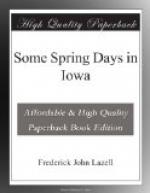A fruit-lover is the catbird, beginning with the June berries on the banks of streams near which she often builds her nest and continuing with wild strawberries, blackberries, wild grapes and the berries of the Virginia creeper—sometimes also seen busily scooping out a big hole on the rosy side of a tempting apple in the orchard. Some observers say the catbird eats the eggs of the fly-catcher and other birds, but this must be seen to be believed.
There comes an outbreak of melody from the top of a tall black willow, much like the tones of the robin and yet suggestive of the warbling vireo, but finer than the former, clearer, louder and richer than the latter. We lift our eyes and see the pointed carmine shield of the rose-breasted grosbeak, one of the most beautiful, useful and music-full birds in the forest or the garden. Many mornings and evenings during the month of May one of these handsome fellows was busy in my garden, diligently picking the potato bugs from the young vines, stopping now and then, especially in his morning visits, to pour out a happy, ringing lyric and to show his handsome plumage. On one occasion he took a couple of potato bugs in his “gros” beak as he flew to the nearby woodland, probably a tempting morsel for his spouse’s breakfast. A bird that can sing better than a warbling vireo, whose carmine breast is comparable only to the rich, red rose of June, who picks bugs from potato vines, singing chansons meanwhile and who is so good to his wife that he does a large share of the incubation, and takes largely upon himself the care of their children is surely a “rara avis” and worth having for a friend. He is a typical bird of June. His color matches the June roses, his songs are full and sweet and rich as the June days, and the eggs of his soberly dressed spouse are usually laid and hatched in June. There is a nest in a hawthorn bush where the wild grape twines her crimson-green clusters and by the time the blossoms break and fill the air with fragrance, no accidents coming meanwhile, four young grosbeaks will be the pride of as warm a paternal heart as ever beat in bird or human breast.
Perceiving that we are watching him the grosbeak ceases his ringing tones and drops into that dreamy, soft, melodious warble, which is characteristic of this songster as it is of the catbird. But he leaves when a belted kingfisher comes screaming along the stream.
* * * * *




